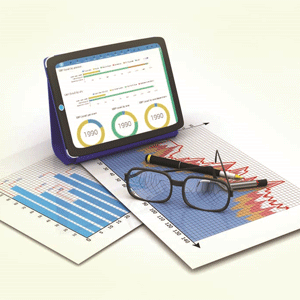THANK YOU FOR SUBSCRIBING

Santosh Kotnis, EVP & CEO, Futurism Technologies
When it comes to emerging technologies, one phrase that has drawn more controversy than others have is cloud computing. Two words, which have driven countless debates, caused numerous arguments in IT departments, and more often than we would care to admit, have left many in the industry deeply confused.
Similar technology transformation is happening in ERP space as well. The cloud is making on-premises ERP implementations an endangered species. This is a big change from just a few years ago, when cloud ERP was met with skepticism, particularly among large companies with big investments in on-premises systems. Attitudes have changed as IT and business management have come to understand the cloud's capabilities and value proposition.
Cloud-based ERP platforms rely on hosted internet services, rather than an on-premises networked server infrastructure to deploy core enterprise systems such as financial applications, human resources (HR) tools, and supply chain management (SCM) software. The original advantages of cloud ERP were faster deployments, immediate enterprise-wide availability of the latest versions of applications, less need for on-site support, and simpler pricing. Later systems featured greater ease of use, mobile-enablement of applications and easier integration with outside data sources. Today, the most up-to-date cloud-based ERP systems have Internet of things (IoT) and machine learning capabilities.
With cloud-based ERP offering so many pluses, why even consider an on-premises option? Even market leaders SAP and Oracle admit that few companies are deploying new on-premises ERP systems. Research firm Gartner predicts that the cloud will become the default option for software deployment by 2020. The writing is on the wall: Cloud will rule and on-premises ERP is heading for legacy status.
Change in Attitude towards Cloud
Two barriers to cloud ERP adoption had been security concerns and resistance to change among IT leaders. The latter is understandable, considering the investment made in the software, training, and support infrastructure of on-site systems, not to mention the risk associated with replacing any core business system.
Cloud-based ERP platforms rely on hosted internet services, rather than an on-premises networked server infrastructure, to deploy core enterprise systems
Those areas of cloud's perceived weakness are now seen as strengths. For example, with on-site IT infrastructures, security degrades over time as upgrades are skipped and new software with additional risks is integrated. With cloud-based ERP, the latest security updates are always deployed and it's easier to maintain the integration points to keep up with security for apps outside the core system.
While IT teams might get attached to systems they know, they hate the constant update/upgrade cycles, the database maintenance, the training requirements, and the customization needed to keep them running. For example, Oracle customer HSBC opted to move to the cloud when it was looking at an 18-20 month upgrade project for its on-premises ERP deployment. In contrast to a year-and-a-half upgrade, the cloud migration took about six months.
Vendor Strategies and Customer Options
Cloud ERP vendors generally fall into one of these two categories: Cloud natives, such as Workday and NetSuite, whose systems were developed for the cloud from the start, and traditional ERP vendors like Oracle, SAP, Infor, and Microsoft, which have developed cloud offerings and whose products offer continuity and familiarity to their existing on-premises customers and appeal to new users who want to deploy in the cloud. SAP has hedged its bets by acquiring cloud ERP natives SuccessFactors and Ariba, and Oracle has announced plans to buy NetSuite for $9.3 billion.
A key difference between cloud natives and traditional vendors is in the infrastructure used to support and deliver the services. Cloud natives rely on third-party cloud infrastructure providers such as Amazon Web Services (AWS) or Microsoft. Traditional vendors mostly develop their own cloud infrastructures; the exception is Infor, which partnered with AWS.
Enabling the Business
The deciding factor for companies evaluating cloud-based ERP systems boils down to the value added and practical considerations like cost, ease of implementation, level of support, and issues related to legacy systems.
Summary
More companies are likely to take cloud-first or even cloud-only approaches to ERP as the cloud become the dominant means of deploying enterprise software. In fact, businesses may find themselves without a choice in the near future. ERP vendors are pursuing their own versions of cloud-first strategies and are pouring resources into developing their cloud-based ERP offerings. Gartner predicts that 30 percent of the 100 largest software vendors will shift to cloud-only models by 2019. Companies that don't embrace the cloud may find themselves with limited options and at a competitive disadvantage.
Based in Pune, India, Futurism Technologies is an Information Technologies and Services company. Founded in 2001, the company provides end-to-end cost-effective and quality ITeS solutions and also specializes in business consulting, application development and cloud computing etc.













